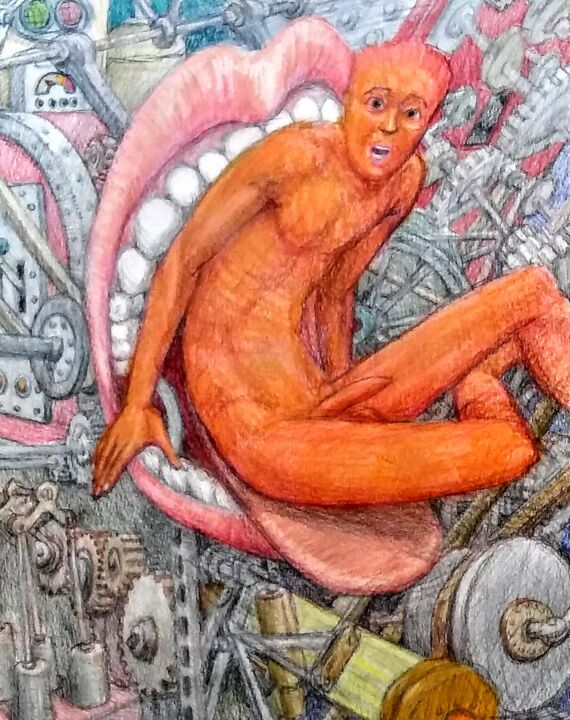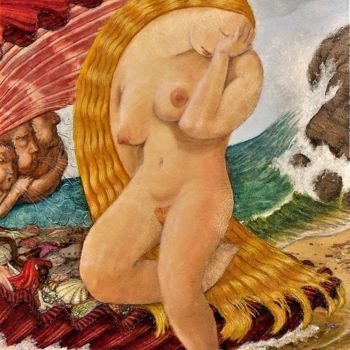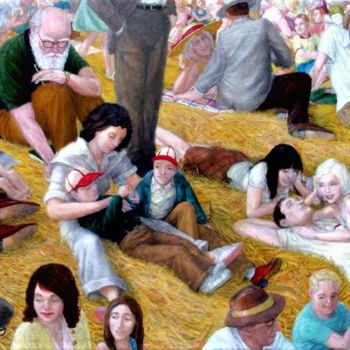


Faites-nous savoir si vous souhaitez voir plus de photos de cette œuvre !
- Arrière de l'oeuvre / Côté de l'oeuvre
- Détails / Signature / Surface ou texture de l'œuvre
- Oeuvre en situation, Autre...
Food for the Machinery (2022) Dessin par Edwin Loftus
Plus d'info
- Emballage (Boîte ou emballage en carton) Toutes les œuvres sont expédiées soigneusement protégées et assurées, avec un transporteur premium.
- Suivi Suivi de commande jusqu'à la livraison à l'acheteur. Un numéro de suivi vous sera fourni afin que vous puissiez suivre le colis en temps réel.
- Délais Livraison dans le monde entier en 3 à 7 jours (Estimation)
Plus d'info
- Certificat d'authenticité en ligne traçable Les certificats d'authenticité peuvent être vérifiés en ligne à tout moment en scannant le code de l'oeuvre.
- Certification de la cote artiste Les experts étudient l'œuvre et la carrière d'un artiste puis établissent une cotation moyenne indépendante et fiable. La cotation moyenne permet de situer l'artiste sur une gamme de prix pour une période donnée. Les experts peuvent également être sollicités pour établir une estimation plus précise pour une œuvre en particulier.
Plus d'info
Paiement 100% sécurisé avec un certificat SSL + 3D Secure.
Plus d'info
Cette impression est disponible en plusieurs tailles.
Vendeur Edwin Loftus
Cette image est disponible pour téléchargement avec une licence
Vendeur Edwin Loftus
-
Œuvre d'art originale (One Of A Kind)
Dessin,
Pastel
sur Carton
-
Dimensions
20x16 in
Dimensions de l'oeuvre seule, sans encadrement: Hauteur 14in, Largeur 11in - Encadrement Cette œuvre est encadrée (Cadre + sous verre)
- Catégories Dessins à moins de 5 000 $US Art conceptuel Politique
The Great Machine of the State feeds upon a portion of what the people produce when they sell their time for payment in exchangeable currency and the State takes a portion of their pay for its maintenance. But the people are mortal. They have only limited time to sell. When the state takes part of their payment from them, it is taking from them that portion of their limited time spent earning the portion of their payment that is taken.
If a person exchanges 40 hours of their life each week for 40 amounts of payment and the State takes from them 10% of their pay, it is the same as taking 4 hours of their lives away from them each week. There are 52 weeks in a year. 4 x 52 = 208 hours of their lives taken from them. If an average length a person must work is 40 years, that means the State takes from them, 40 x 208 hours = 8,320 hours, in the course of their working life. Translated into days - 8,320 hours / 24 hours = 346.6 ... days, (or nearly one year), of your life that is taken from you with only what compensation in benefits you get from the State in payment.
You might think that this sounds not so bad. But that is only if all that the Sate takes is 10%. If it takes 20% or 30% of your earnings, you will lose the equivalent of 2 to 3 years of your life spent working for the State.
But it isn't only time that you lose, it's also opportunity. Think of the difference even half of that 10% would make if you were earning 5% more each payday.
And earnings aren't the only ways you feed the State a portion of your life. When they tax products or services and their sale, you pay for it in the increased cost of the product in your cost to purchase it. The people selling the product or service might take some of that as a loss, but seldom all of it. You exchange more of your life in higher costs. Where I live, those taxes add up to between 10% and 30% of the cost of the product or service.
But that is only half of the ways you feed the State. Regulations and Corruption also increase the percentage of your life that is sacrificed in order to keep the machinery of the State running.
Regulations can be good in helping to keep toxins out of the products and cheating out of the services you buy. That can be good, but it can also force businesses to spend large amounts of currency on generating the proofs that they are complying with the regulations, proofs they are required to show to inspectors, even if they were already doing what the regulations say or would have done so had they just been told that there was a need for a change to be made or a standard to be met. And large businesses have learned that the increased costs of regulatory compliance can be used to make it harder for smaller businesses, with fewer profits, to survive. So, they use support of regulations to suppress new competitors with new and often better ideas. And the people pay in higher prices due to costs passed on, less competition that might force lower prices, and less choice in what to purchase. The larger and more centralized regulatory power is, the easier and more profitable it is for large, well-financed businesses to corrupt the system, using it to manipulate the marketplace. And the greater the power of government is the more temptation and opportunity there is for the unscrupulous to invest in influencing it and the more temptation and opportunity there is for unscrupulous people to seek positions in the State's machinery where they can corruptly profit from their positions.
The people, sometimes directly and sometimes indirectly pay for all of these things and the greater and more extensive the State's powers are, the more they will have to pay. And instead of their lives being opportunities in which hard work and daring ideas are rewarded, they live their lives knowing that they will be lucky if nothing ever goes disastrously wrong and that it is very unlikely that their lives will ever get significantly better. The State's need to be fed will take away a large percentage of everything they can earn and the only rewards that might be achievable will be in their relationships to family and friends ... unless the State can find a way to take a cut of that as well.
Governments are meant to serve the people. But as they grow, they become corrupt, and the people end up serving the will and whims of their governments.
Thèmes connexes
Edwin Loftus est un peintre et dessinateur américain né en 1951. Son intérêt pour l'art a commencé à l'âge de 4 ans lorsqu'il a décidé de dessiner quelque chose de réel plutôt que de travailler à partir de son imagination.
Enfant, il excellait dans le dessin et à l'adolescence, il commença à expérimenter la peinture à l'huile. Au collège, il a suivi des cours d'art et d'histoire de l'art et s'est rendu compte que le véritable art n'avait rien à voir avec la qualité du dessin ou de la peinture, mais qu'il devait avoir l'ambition de repousser les limites et d'élargir l'expérience visuelle.
Il a également étudié la philosophie, la psychologie et l'histoire et s'est rapidement rendu compte qu'il ne s'agissait que d'un autre établissement artistique essayant de défendre son industrie élitiste et son système de récompense. Leurs compétences étaient presque inexistantes, ils ne connaissaient rien à la psychologie, à la perception ou à la réponse aux stimuli, et ils étaient des extensions du système de croyances qui ont fait du communisme, du fascisme et d'autres formes de totalitarisme des forces destructrices dans le monde. Ils croient littéralement que l'art ne devrait pas être accessible aux êtres humains ordinaires, mais seulement à une élite « sophistiquée » suffisamment pour le comprendre.
Edwin Loftus s'est rendu compte que les empereurs de l'art n'avaient pas de vêtements, mais ils étaient toujours les empereurs. Doué en art, il a travaillé dur pour acquérir cette compétence. Il a donc trouvé d'autres moyens de gagner sa vie et a vendu quelques œuvres de temps en temps. Pendant soixante ans, de nombreuses personnes ont apprécié ses œuvres et certaines les ont collectionnées.
Aujourd'hui, Edwin Loftus est à la retraite. Même s'il vendait toutes ses peintures au prix qu'il demandait, "artiste" serait le travail le moins bien payé qu'il ait jamais eu... mais c'est comme ça. Cela n'aura pas d'importance pour lui après sa mort. Il espère juste que certaines personnes aimeront suffisamment ce qu'il fait pour en profiter à l'avenir.
-
Nationalité:
ÉTATS-UNIS

- Date de naissance : 1951
- Domaines artistiques: Oeuvres d’artistes côtés,
- Groupes: Artistes côtés Artistes Contemporains Américains







